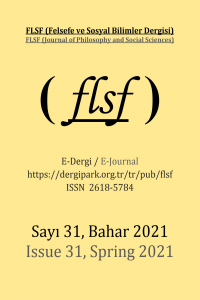Abstract
Bu çalışmada, yapay zekanın ortaya çıkışının hassas ayar argümanı ve genel olarak Tanrı’nın varlığına dair tasarım argümanları için yeni bir sorun oluşturduğu görüşünü savunuyorum. Hassas ayar argümanına karşı yapay zeka itirazı olarak adlandırabileceğimiz bu itiraz, kısaca şu şekilde ifade edilebilir: Bilinçsiz yapay zeka sistemlerinden modellenerek kavramsallaştırılabilecek, şahıs olmayan mükemmel bir tasarımcı, evrenin tasarımcısı olarak mükemmel bir şahıs olan Tanrı’ya bir alternatif teşkil eder ve bu yüzden de evrenin bir tasarımcısı olduğu iddiasından Tanrı’nın varlığına dair geçerli bir çıkarım yapmamıza izin vermez. Bu itirazın bertaraf edilmesi ancak töz ikiciliği doğru ise, yani insanların ruhları var ise mümkündür, ve bu da hassas ayar argümanının sonucunu ruhun varlığına koşullu kılacağından argümanın etkisini önemli ölçüde zedeler.
References
- Behe, Michael J. Darwin's Black Box: The Biochemical Challenge to Evolution. New York: Free Press, 1996.
- Bostrom, Nick. “Are We Living in a Computer Simulation?” Philosophical Quarterly. Vol. 53, No. 211, pp. 243-255, 2003
- Bourget, David & Chalmers, David J. “What do philosophers Believe?” Philosophical Studies,170 (3), 465-500, 2014
- Collins, R. “The teleological argument: an exploration of the fine-tuning of the cosmos.” In W. L. Craig and J.P. Moreland (eds.) The Blackwell Companion to NaturalTheology. Oxford: Blackwell, pp. 202–281, 2009
- Hartree, Douglas R. Calculating instruments and machines. Urbana, IL: University of Illinois Press, 1949
- Hawking, S. W. The illustrated a brief history of time. Random House, 1996
- Manson, Neil A. “The fine-tuning argument.” Philosophy Compass 4 (1), 271-286, 2009
- Montag, Ali. “A portrait created by A.I. is being auctioned for the first time at Christie's — here's how much it's worth”, 2018 <https://www.cnbc.com/2018/08/24/obvious-ai-created-portrait-being-auctioned-at-christies.html>
- Paley, W. Natural Theology: or, Evidences of the Existence and Attributes of the Deity. 12th edition, London: Printed for J. Faulder by Wilks and Taylor, 1809
- Plantinga, A. Does God Have a Nature? Milwaukee: Marquette University Press, 1980
- Quick, Donya. “Kulitta.” <http://www.donyaquick.com/kulitta>, 2018
- Swinburne, Richard. The Existence of God. Oxford: Clarendon Press, 1991
- Turing, Alan M. “Computing machinery and intelligence.” Mind, 59, 433-460, 1950
- Wainwright, William. "Concepts of God", The Stanford Encyclopedia of Philosophy (Spring 2017 Edition), Edward N. Zalta (ed.), 2017 <https://plato.stanford.edu/archives/spr2017/entries/concepts-god/>.
- Weinberg, S. “Life in the Universe”. Scientific American, Oct., 1994
Abstract
I argue that the advent of artificial intelligence poses a new problem for the fine-tuning argument and design arguments for God in general, since an impersonal supreme designer, conceptually based on artificial intelligence, is a relevant alternative to God as the designer of the universe (or the designer of allegedly irreducibly complex biological structures, etc.) There are of course differences between a personal designer, like a human being, and an impersonal designer, like a narrow-AI system, but, as I argue, only if humans have souls would it be more reasonable to regard God as the supreme designer rather than an impersonal designer modeled on soulless artificial intelligence. In other words, the fine-tuning argument for God can only be successful if something like substance dualism is demonstrated to be true. Dialectically speaking, this makes the fine-tuning argument considerably less effective.
References
- Behe, Michael J. Darwin's Black Box: The Biochemical Challenge to Evolution. New York: Free Press, 1996.
- Bostrom, Nick. “Are We Living in a Computer Simulation?” Philosophical Quarterly. Vol. 53, No. 211, pp. 243-255, 2003
- Bourget, David & Chalmers, David J. “What do philosophers Believe?” Philosophical Studies,170 (3), 465-500, 2014
- Collins, R. “The teleological argument: an exploration of the fine-tuning of the cosmos.” In W. L. Craig and J.P. Moreland (eds.) The Blackwell Companion to NaturalTheology. Oxford: Blackwell, pp. 202–281, 2009
- Hartree, Douglas R. Calculating instruments and machines. Urbana, IL: University of Illinois Press, 1949
- Hawking, S. W. The illustrated a brief history of time. Random House, 1996
- Manson, Neil A. “The fine-tuning argument.” Philosophy Compass 4 (1), 271-286, 2009
- Montag, Ali. “A portrait created by A.I. is being auctioned for the first time at Christie's — here's how much it's worth”, 2018 <https://www.cnbc.com/2018/08/24/obvious-ai-created-portrait-being-auctioned-at-christies.html>
- Paley, W. Natural Theology: or, Evidences of the Existence and Attributes of the Deity. 12th edition, London: Printed for J. Faulder by Wilks and Taylor, 1809
- Plantinga, A. Does God Have a Nature? Milwaukee: Marquette University Press, 1980
- Quick, Donya. “Kulitta.” <http://www.donyaquick.com/kulitta>, 2018
- Swinburne, Richard. The Existence of God. Oxford: Clarendon Press, 1991
- Turing, Alan M. “Computing machinery and intelligence.” Mind, 59, 433-460, 1950
- Wainwright, William. "Concepts of God", The Stanford Encyclopedia of Philosophy (Spring 2017 Edition), Edward N. Zalta (ed.), 2017 <https://plato.stanford.edu/archives/spr2017/entries/concepts-god/>.
- Weinberg, S. “Life in the Universe”. Scientific American, Oct., 1994
Details
| Primary Language | English |
|---|---|
| Subjects | Philosophy |
| Journal Section | Research Article |
| Authors | |
| Publication Date | May 12, 2021 |
| Submission Date | January 5, 2021 |
| Acceptance Date | March 16, 2021 |
| Published in Issue | Year 2021 Issue: 31 |
Starting from 2024, our journal will be published in 3 issues as two regular and one special issues. These issues will be published In May (regular issue), September (special issue) and December (regular issue).
Acceptance of articles for our special issue and our regular issue in December will begin on March 15.
Only articles within the scope of the file will be included in our special issue.
Thank you for your attention.


